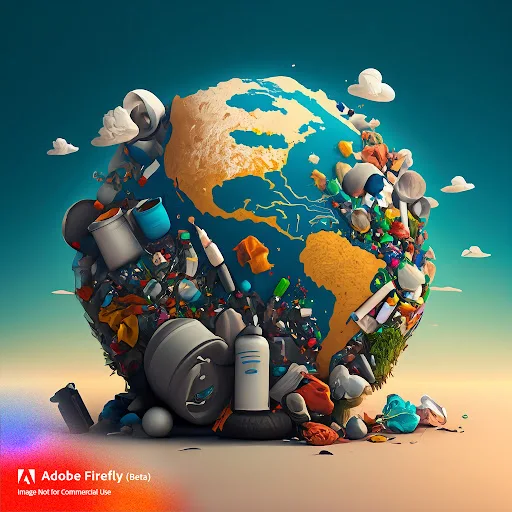As our global population continues to surge, so does the creation of waste. The alarming rate at which waste is being generated and mismanaged has led our world down a perilous path – one where our once pristine environment is rapidly transforming into a house of garbage. This article delves into the factors contributing to this ominous shift, the environmental consequences, and the urgent need for collective action to reverse this hazardous trend.
 |
The Culprits
1. Consumerism: Our modern culture glorifies consumerism, promoting the accumulation of goods, often with a short shelf life. The insatiable demand for new products fuels overproduction and waste.
2. Single-Use Plastics: The convenience of single-use plastics has led to a massive increase in their consumption. Items like plastic bags, bottles, and packaging are discarded in staggering quantities.
3. Rapid Urbanization: As cities expand, so does waste generation. Urban areas grapple with inadequate waste management systems, leading to rampant littering and dumping.
4. E-Waste Epidemic: The rapid pace of technological advancement results in electronic gadgets quickly becoming obsolete, leading to an avalanche of electronic waste.
Environmental Consequences
1. Pollution of Land and Water: Improper waste disposal pollutes land and water bodies, endangering ecosystems, and contaminating resources.
2. Loss of Biodiversity: Waste pollution destroys habitats and endangers species, contributing to biodiversity loss.
3. Greenhouse Gas Emissions: Landfills and incineration sites release harmful gases like methane and carbon dioxide, exacerbating climate change.
4. Soil Degradation: Contaminated soil affects agriculture, compromising food security and human health.
From Garbage to Solutions
1. Sustainable Consumption: Promoting conscious consumer choices and reducing excessive consumption can curb waste generation.
2. Recycling and Circular Economy: Encouraging recycling and adopting a circular economy model helps transform waste into valuable resources.
3. Plastic Alternatives: Developing and utilizing biodegradable and sustainable alternatives to single-use plastics is essential.
4. Improved Waste Management: Investing in efficient waste collection, sorting, recycling, and disposal infrastructure is critical for waste reduction.
5. Environmental Education: Raising awareness about waste's impact and the importance of responsible waste management can drive behavioral change.
Global Collective Responsibility
1. Government Policies: Governments must enact stringent regulations on waste management and promote sustainable practices.
2. Industry Accountability: Industries should adopt eco-friendly production processes and assume responsibility for proper waste disposal.
3. Community Engagement: Empowering communities to organize clean-up drives and waste management initiatives can make a significant impact.
4. International Cooperation: Collaborative efforts on a global scale are essential to address transboundary waste issues.
Conclusion
The transformation of our world into a house of garbage is a stark reminder of the dire consequences of unchecked waste generation. The consequences, ranging from environmental degradation to threats to human health, necessitate immediate action. Embracing sustainable consumption, responsible waste management, and a shift towards eco-friendly practices are key steps towards reclaiming our environment from the clutches of waste. It is imperative that individuals, communities, industries, and governments unite to steer our world away from the brink and towards a cleaner, healthier future.
